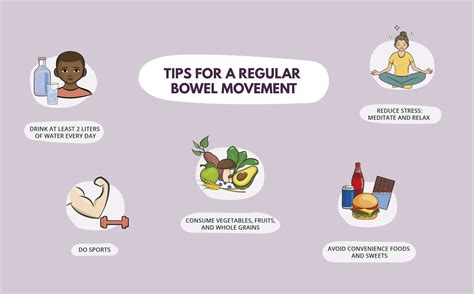Maintaining regular bowel movements is not just about feeling comfortable and avoiding constipation; it’s also crucial for your overall health. Regularity promotes a healthy digestive system, reduces the risk of certain diseases, and may even contribute to a longer lifespan.

The Benefits of Bowel Regularity
A healthy bowel movement frequency can vary from person to person, but most experts recommend aiming for at least one bowel movement per day. Here are some of the benefits associated with regularity:
- Reduced risk of constipation: Regular bowel movements prevent feces from becoming hard and dry, making them easier to pass.
- Lower risk of hemorrhoids: Constipation can strain the veins in the rectum and anus, leading to hemorrhoids. Regularity helps reduce this risk.
- Improved nutrient absorption: When food moves through the digestive system too slowly, nutrients may not be absorbed properly. Regularity ensures efficient nutrient absorption.
- Reduced risk of colon cancer: Studies have shown that people who have regular bowel movements may have a lower risk of colon cancer.
- Better mood and sleep: Regular bowel movements can reduce bloating and discomfort, which can improve mood and sleep quality.
Factors Affecting Bowel Regularity
Several factors can affect bowel regularity, including:
- Diet: A diet high in fiber (fruits, vegetables, and whole grains) promotes regular bowel movements.
- Water intake: Staying hydrated helps soften stools and facilitate their passage.
- Physical activity: Exercise stimulates the bowels and promotes digestion.
- Stress: Stress can slow down the digestive system, leading to constipation.
- Medications: Certain medications, such as iron supplements and antidepressants, can cause constipation.
Establishing a Regular Bowel Movement
If you struggle to have regular bowel movements, there are several things you can do to improve regularity:
- Increase fiber intake: Aim for 25-30 grams of fiber per day from fruits, vegetables, and whole grains.
- Drink plenty of water: Aim for 8-10 glasses of water per day.
- Get regular exercise: Engage in at least 30 minutes of moderate-intensity exercise most days of the week.
- Manage stress: Find healthy ways to manage stress, such as exercise, yoga, or meditation.
- Consult a doctor: If you have persistent constipation or other bowel problems, consult a doctor to rule out any underlying medical conditions.
Tips and Tricks
Here are some additional tips and tricks to promote bowel regularity:
- Establish a bowel routine: Go to the bathroom at the same time each day, even if you don’t feel the urge.
- Use a footstool: Elevating your feet when sitting on the toilet can help relax the muscles involved in bowel movements.
- Warm soak: Sitz baths or warm showers can relax the muscles and stimulate bowel movements.
- Try probiotics: Probiotics are beneficial bacteria that can help support a healthy digestive system.
- Consider over-the-counter laxatives: If dietary and lifestyle changes are not enough, over-the-counter laxatives may provide short-term relief.
Pros and Cons of Common Treatments
Fiber supplements:
- Pros: Effective, natural, and generally safe
- Cons: Can cause gas, bloating, and stomach cramps
Laxatives:
- Pros: Fast-acting and effective
- Cons: Can be habit-forming, can cause dehydration, and should not be used long-term
Enemas and suppositories:
- Pros: Can quickly relieve constipation
- Cons: Can be uncomfortable, can irritate the rectum, and should only be used occasionally
FAQs
1. What is the normal frequency of bowel movements?
Most experts recommend aiming for at least one bowel movement per day, but it can vary from person to person.
2. Why is it important to treat constipation?
Constipation can lead to hemorrhoids, fecal impaction, and other health problems.
3. What are the signs and symptoms of constipation?
Constipation is characterized by infrequent bowel movements (less than three per week), hard, dry stools, and difficulty passing stools.
4. How does exercise affect bowel regularity?
Exercise stimulates the bowels and promotes digestion.
5. Can stress cause constipation?
Yes, stress can slow down the digestive system, leading to constipation.
6. When should I see a doctor about constipation?
If you have persistent constipation or other bowel problems, consult a doctor to rule out any underlying medical conditions.
